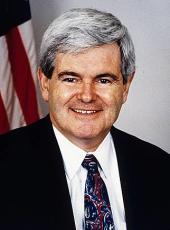Originally posted on HumanEvents.com
By Newt Gingrich
Earlier this month, a panel appointed by the Department of Health and Human Services made a recommendation so detached from the good of individual patients it could only have come from government bureaucrats. They recommended eliminating screening for the most common cancer among males nationwide.
The United States Preventative Services Task Force (USPSTF) is composed of 16 government-selected experts whose recommendations often influence the reimbursement policies of Medicare and private insurers. The range of members' backgrounds is narrow considering the group is charged with advising the federal government and other healthcare providers on specific medical procedures: almost all are academics or administrators rather than practicing physicians. The panel includes experts in pediatrics and newborn care, in mental health and geriatrics, but not a single urologist who actually takes care of prostate cancer patients.
Despite lacking any specialist who deals with the issue, the panel issued a recommendation this month to stop using the only available test to screen for prostate cancer. PSA tests, which measure levels in the blood of a marker known to be elevated in men with prostate cancer, are the sole method of screening other than digital examination by a doctor, which cannot detect the most common form and usually identifies those cancers it can much later, when they are less curable.
Without the PSA testing, many men will have no way to know they have the disease until it has developed into much more dangerous problem. In some cases, it will be a too late by the time they discover it.
What is the basis for the panel's recommendation to discontinue screening that can save lives?
It has nothing to do with the merits of the test. Instead, these government-appointed experts advised against screening because they disagree with what some doctors and patients choose to do with the information once they have it.
Prostate cancer is a complicated issue, and elevated PSA is not always a sign that a man should enter treatment. In some cases, men can live with benevolent cancers and remain healthy for years. In many other cases, it is simply unclear even from biopsies whether the cancers are benevolent or lethal, as both kinds register on test results.
Understandably, many men faced with this information want to do everything possible to make sure they do not have a lethal cancer, and many doctors, as well, recommend curative therapy even when they are not certain the cancer is lethal. There are definitely patients, especially older men, who undergo treatment for prostate cancer they could have lived with if it had gone undetected.
If prostate cancer is over-treated, the sensible response for the USPSTF would have been to call on the National Institute of Health and the National Cancer Institute to help develop a better and more accurate test, and to advise doctors and patients to consider more conservative approaches when the test suggests the presence of prostate cancer.
Instead, the task force's answer is simply to deny doctors and patients the chance to consider early treatment by recommending they not screen for prostate cancer in the first place.
That is not a reasoned response to the problem. It is a bureaucratic response to the problem. And people will almost certainly die because of it.
This points to the difference between the bureaucratic approach to healthcare, which leads to rationing, and an approach to empower individuals and their doctors to make the best decisions for them.
Bureaucrats cannot comprehend the complicated details of all the individuals for whom they try to make decisions and so they issue one-size-fits-all pronouncements for large classes of people. In this case, when the bureaucratic approach identifies a class that is being over-treated, it calls for the elimination of screening to warn of the disease. That way fewer people will have the information they need in order to be faced with choices involving some options the bureaucrats consider undesirable. Physicians can't over-treat a prostate cancer they have not detected.
Of course, it is ridiculous to have a handful of government bureaucrats with no expertise in the matter issuing recommendations that influence federal, state, and private health systems in crafting policies. Doctors and patients are in the best position to determine whether individuals should be screened for prostate cancer and to judge the best course of action afterward.
No one should want the government interfering in these very personal medical decisions. Lethal bureaucracy is a disease we can't afford—and one that is entirely preventable with the right policies.
Newt Gingrich, Gingrich Campaign Press Release - Death by Bureaucracy Online by Gerhard Peters and John T. Woolley, The American Presidency Project https://www.presidency.ucsb.edu/node/298633

